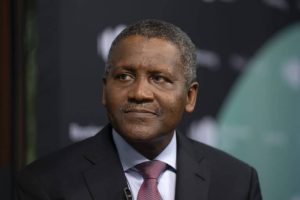 Alhaji Aliko Dangote, President and Chief Executive of Dangote Group, has urged the Federal Government to abolish fuel subsidies entirely. He believes that doing so will provide a clearer picture of the country’s actual petrol consumption.
Alhaji Aliko Dangote, President and Chief Executive of Dangote Group, has urged the Federal Government to abolish fuel subsidies entirely. He believes that doing so will provide a clearer picture of the country’s actual petrol consumption.
In a recent interview with Bloomberg Television in New York, Dangote announced that his $20 billion mega refinery in Lagos, which has the capacity to process 650,000 barrels of crude oil daily, is set to commence operations next month.
Dangote emphasized that the removal of fuel subsidies would significantly alleviate pressure on Nigeria’s currency, the naira. He stated, “Subsidy is a very sensitive issue. When a subsidy exists, it often leads to inflated prices, resulting in unnecessary costs for the government. Now is the right time to eliminate these subsidies.”
He highlighted that the refinery would help accurately measure Nigeria’s fuel consumption, which is currently estimated at varying levels. “By producing locally, we can track usage effectively, ensuring that fuel stays within Nigeria and saving the government considerable funds,” he added.
Reflecting on the challenges faced since the project began in 2013, Dangote expressed pride in overcoming obstacles, including a five-year delay and a substantial loan of $2.4 billion. He acknowledged the necessity for profitability given the scale of investment but reiterated that the decision to end subsidies rests with the government.
President Bola Tinubu initially removed the subsidy upon taking office in May 2023, sparking protests amid rising living costs. The government later reinstated it as inflation escalated. Recent adjustments, including an easing of the gasoline price cap, have been taken, although prices remain below market levels.
Dangote noted that Nigeria has historically relied on imported petroleum products, with subsidies costing the government $10 billion in 2022. He underscored that discontinuing fuel imports could ease currency pressures significantly, especially since the naira has depreciated by about 70% against the dollar since last year.
“Petroleum products account for approximately 40% of our foreign exchange expenditure,” he explained. “Our refinery’s output could help stabilize the naira.”
In discussing recent pricing issues with the Nigerian National Petroleum Company Limited (NNPC), Dangote clarified that the NNPC purchased fuel from his refinery at competitive rates, although discrepancies in pricing were noted during public announcements.
On the upcoming crude oil sales expected to start in October, Dangote shared that ongoing discussions aim to finalize an agreement for selling crude in naira, which he believes will further alleviate pressure on the naira and create a mutually beneficial arrangement for both his company and the NNPC.
In related developments, the Federal Government is working to establish a dedicated parking facility for fuel tankers near the Dangote refinery, following concerns over congestion on local roads. Minister of Works, Dave Umahi, noted that a new park would prevent wear and tear on existing infrastructure.
The council also approved several road projects across the country, including the rehabilitation of key highways and the construction of a new three-lane carriageway, aimed at improving transportation and safety.
As Dangote prepares for the launch of his refinery, he remains optimistic that the changes in fuel subsidy policy can contribute to Nigeria’s economic stability and future growth.

